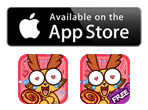PocketGamer: Board and Mobile Games Convergence
Stephen was recently asked to contribute a series of articles for PocketGamer.biz on behalf of the Best of British initiative. Head on over to the official site to read his first article looking at the mobile and board-games convergence. We’ve reprinted the article below:
An odd thing happened during the Best of British Winter game jam. Twenty of the finest British mobile game developers had gathered at the Mind Candy HQ… and there I was, playing with little wooden cubes trying to prevent the world imploding from a particularly deadly strain of viruses. On the tables nearby, trains were being guided across the American plains and cheesy B-movie monsters were trashing Tokyo.
Not your father’s board games
Board games are currently undergoing a cultural revival here in the UK (and US). Out with the classic (i.e. old) board games of yesteryear. Gone are the Risks (yawn), Cluedos (Yawn) and Monopolys (YAWN!) – relegated to the broom closet – while the new stalwarts of board games parade through. Pandemic, Dixit, Escape, Ticket to Ride, Kings of Tokyo. All of these are worthy of your attention and needn’t be discussed in hushed whispers.
I recently visited Amsterdam and, upon talking to the locals, I found board games are a celebrated pastime – sitting comfortably alongside pints of beer in the pub (or the dubious cigarettes in the Amsterdam coffee houses). In the UK, meanwhile, talk of board games tends to result in odd looks and cautious backpedalling, but public perception is shifting. Walking into a local Waterstones, I normally now find a dedicated altar to the glittering gems of the board gaming hoard. It begged the question:
Are we simply getting tired of mobile games and looking elsewhere, or is there a potential convergence taking place?
The app diaries
Ticket to Ride, from Days of Wonder, is a game about claiming railway routes between two cities – it has won multiple awards including the prestigious 2004 Spiel des Jahres (Game of the Year). Despite the critical reviews and success, there was still the formidable issue of getting people to pay £39.99, ripping off the shrink-wrap and encouraging friends and family to play.
With the release of the Ticket to Ride app, Days of Wonder saw their game rocket up the charts to become App of the Week, and a 70 percent increase in physical sales. A small initial investment of £0.69 was allowing players to explore the brand, convincing them to play with others on the iPad app (£4.99) and, having established a strong foothold, going out to purchase the physical copy.
Two-way street
It’s not the only brand taking advantage of this new crossover. Carcassonne (another Spiel des Jahres winner) has found App Store success thanks to a wonderful adaptation that allows players to explore its rules and emergent gamesplay against either friends or adept AI. Developer TheCodingMonkeys even integrated an ELO ranking system (as used in chess) so you can gauge how well you’re doing in relation to others. The same can be said of the venerable Magic: The Gathering. My first introduction to the game was decidedly mixed – I was fascinated by the artwork but incredibly overwhelmed by the rules. A few short games on the iPad and I was summoning monsters to do my bidding in no time.
Of course, the invasion isn’t just one way. We are now seeing Angry Birdsmaking its way over to Toys’R’Us and Walmart as a Jenga-inspired catapult game in addition to Cut The Rope and Where’s My Water. And, rather oddly, we are also seeing Zynga’s Scrabble-inspired Words with Friends and the Pictionary-esque Draw Something being released as physical board games by Hasbro, the owners of Scrabble and Pictionary!
There’s a trend out there
There is a reason why we play games: to find out how other people react under pressure. Who can we trust to have our back in a tight corner or would they be the first to twist the proverbial knife into your back? Not everyone can hold a conversation but everyone can take on a persona. So why are we seeing this resurgence in physical interaction? With the evolution of the internet, multiplayer and the proliferation of social media, digital life has become increasingly dominant. So, after years of smack-talk over text chat and VOIP, are we finally yearning to go back to face-to-face competition?
As social creatures, we are still in need of physical contact. While portable devices have previously increased the divide, they are now being used to close that gap. The effects of local multiplayer can be seen on contemporary game design.Johan Sebastian Joust dispenses with the screen entirely and instead focuses on the people themselves in a glorified game of tag. SpaceTeam is a social game revolving around shouting incomprehensible sci-fi gibberish at each other. The innuendo-laced Fingle promotes endless physical finger touching in compromising positions. And then there’s Finger-Tied, Bloop and even BoB member Alistair Aitcheson’s Slamjet Stadium – all of which are exploring the physical space with an emphasis on circumventing the rules.
The next wave
So mobile games are no longer solitary experiences and are instead now offering great ways to break the ice, create shared memories and to bond over experiences. If anything, it’s a starting point to exploring alternate uses of mobile technology. When designing your next game, consider looking beyond the traditional solitary confinements and instead look at re-enabling real-life social interactions through physical gaming.
I, for one, am excited about the next wave of physical mobile games.
Many thanks PocketGamer!




